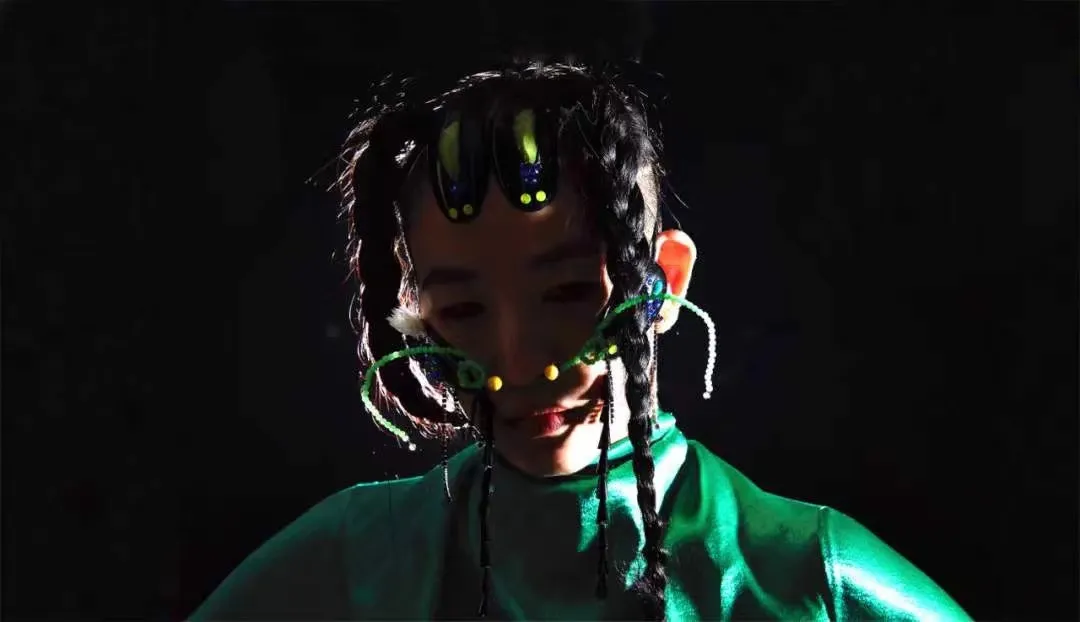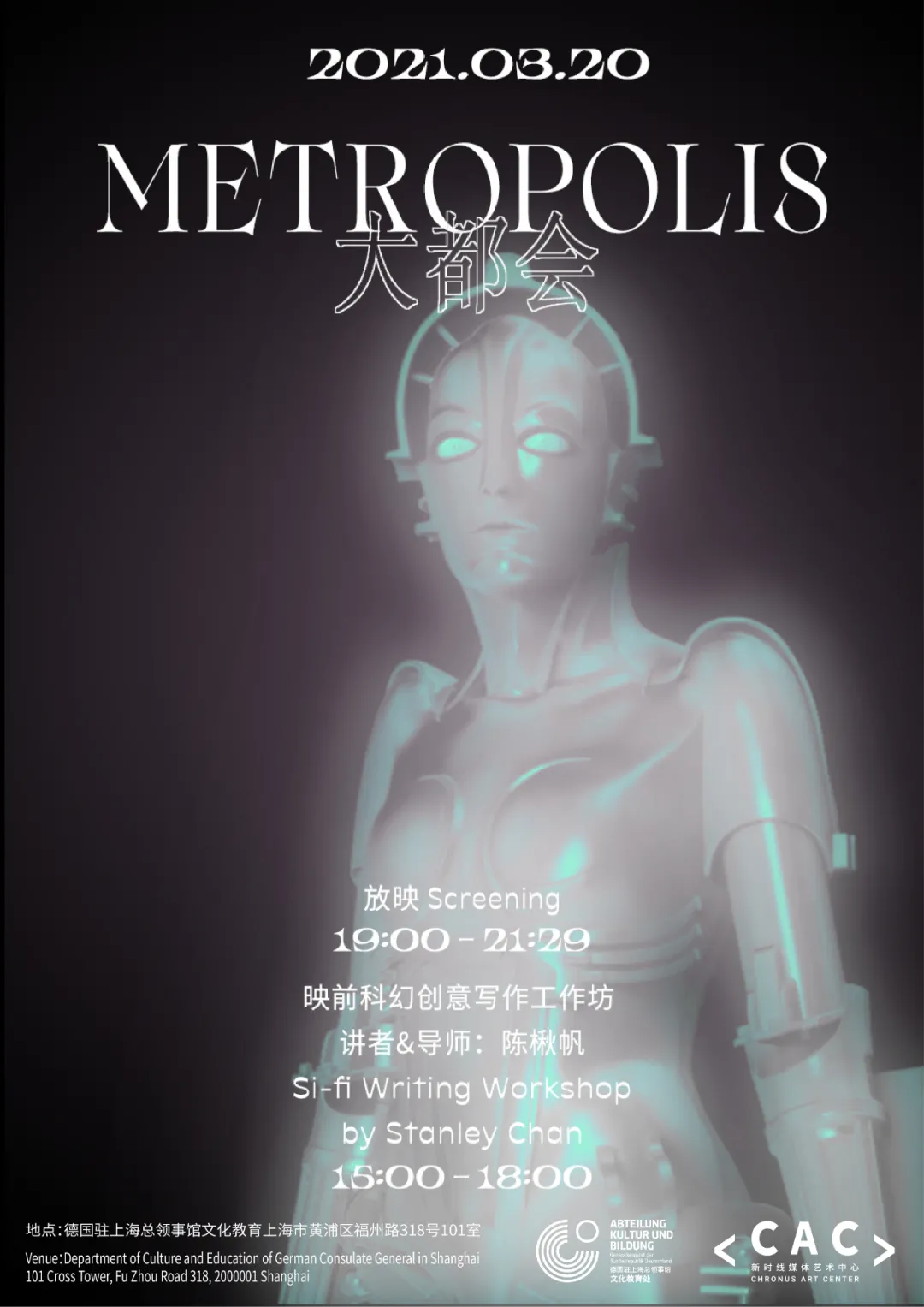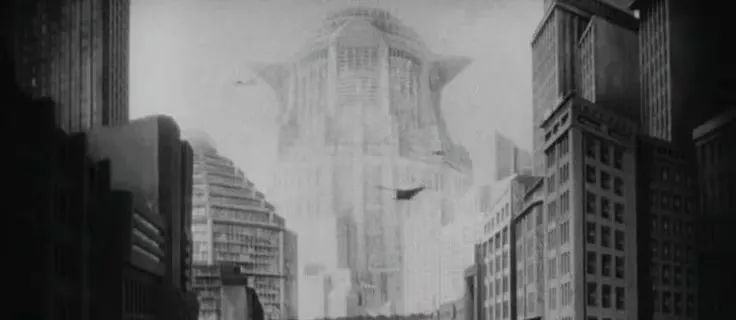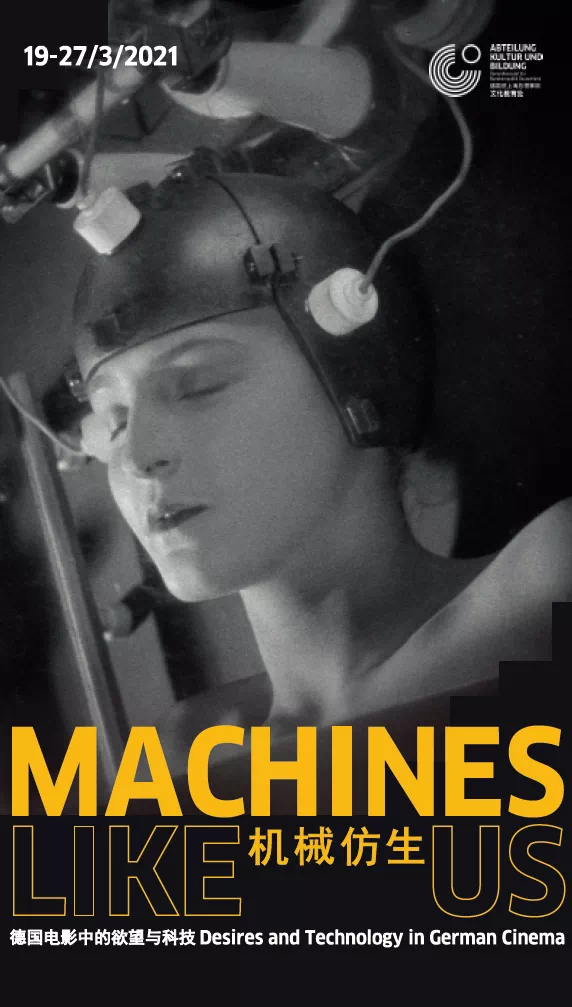CAC x AKuB | Screening Series
2021.03.19 (Friday)
19:00 – 20:16
Screening
The Golem: How He Came Into the World
Director: Paul Wegene,Carl Boese
1920, 76mins
B&W, Silent, German intertitle with English subtitles
20:16 – 21:30
Conversation
Guests: Jan Brauer, 33EMYBW
Language: Chinsese/English
2020.03.20 (Saturday)
15:00 – 18:00
Sci-fi Creative Writing Workshop
Led by CHEN Qiufan
Language: Chinese / Chinese Sign Language
19:00 – 21:29
Screening
Metropolis
1927, 149mins
B&W, Silent, English subtitles
2021.03.24 (Wednesday)
19:00 – 20:35
Screening
In the Dust of the StarsDirector: Gottfried Kolditz
1976, 95mins
In German
2021.03.26 (Friday)
19:00 – 20:30
Screening
Hi, AI
Director: Isabella Willinger
2018, 90mins
In English, German, Japanese and Italian with English Subtitles
2021.03.27(Saturday)
14:00 – 19:00
Film Introduction
Guest: KONG Jingqian
Language: Chinese
Screening
World on a Wire
Director: Rainer Werner Fassbinder
1973, 212mins
In German with English Subtitles
Venue:
Abteilung KulturundBildung des deutschen Generalkonsulats Shanghai (101 Cross Tower, 318FuZhou Lu, Shanghai)
Organized by
AbteilungKulturundBildung, Generalkonsulat der Bundesrepublik Deutschland Shanghai, Chronus Art Center
Machine Like Us:
Desires and Technology in German Cinema
Since the invention of the first stone tools nearly two million years ago up to the present digital era, technology has always been the means that humans use to fulfil desires, obtain resources, modify the world and explore possibilities. The film is also one of the means – by cinematically realising imaginations and establishing human connections. Co-presented by Abteilung Kultur und Bildung and Chronus Art Center, this film showcase serves as an introduction to German science fiction films from the 1920s up till now and encourages our audience to observe how technologies have evolved over time in cinema and in our greater world to meet human desires. This programme involves discourses on gender, politics, society, culture and other areas over the course of history. While it traces how the ancient dream of creation connects with today’s world, it also illustrates how the human condition and our surroundings have been shaped by technological innovations.

© Murnau Stiftung
Der Golem
2021.03.19
Friday
Suffering under an absolute monarchy in Prague in the 1600s, Rabbi Lowe, a magician and master of the Black Art, wants to prevent the persecution of his Jewish people and creates a giant warrior, the golem, to protect their safety. The golem is sculpted of clay and animated by the spirit of Astaroth and is a seemingly indestructible juggernaut with a superpower, performing acts of great heroism yet equally capable of dreadful violence. When the rabbi’s assistant takes control of the golem and attempts to use him for selfish gain, the golem evades human influence…
This finely rendered expressionist work of unleashed desire and potential damnation is based on Jewish folklore. Co-director, Paul Wegener, plays the golem. The film was one of the most successful German silent film productions, both artistically and financially. Despite its bleakness, The Golem still bursts with brightness and hope and is a masterpiece of German horror cinema. Commissioned by Goethe-Institut Hongkong, Berlin-based DJ and electronic music composer JanBrauer accompany this classic silent movie with a contemporary score.
After the screening, artist and musician 33EMYBW will share the creative concept behind her album’Golem’ and further discuss the relationship between the golem, technology, and spirits. The German composer Jan Brauer will also participate via Zoom, joining the conversation with 33EMYBW about the film narrative and the original soundtrack composition. They will also discuss how The Golem is still attractive to the younger generation of musicians and composers in China and Germany, and what other inspirations can be drawn from the film.
Guests

© Jan Brauer
Jan Brauer is a DJ from Berlin as well as an electronic music composer. He co-founded the group Brandt Brauer Frick in 2009 who has made appearances at festivals such as Coachella, Glastonbury, and Haldern Pop. Jan also works on crossover-projects with classical music, theatre and films. In 2017, Brauer composed a new film music score for Sergei Eisenstein’s classic 1925 silent movie BattleshipPotemkin and was premiered to a full house of enthusiastic audiences at the HongKong Arts Centre.

© 33EMYBW
33EMYBW, artist and musician, has been involved in the Chinese music scene for well over a decade. In late 2018, after performing at Berlin’s CTM Festival, 33EMYBW released her debut album ‘Golem’ on Shanghai label SVBKVLT. ‘Golem’ was met with international critical acclaim and was voted one of the best electronic albums of 2018 by Bandcamp, introducing a wider audience to her self-described ‘limb-dance’ sound. Early the following year she also released ‘Dong 2’ on Beijing’s Merrie Records, a concept album sampling traditional music, sounds and field recordings from the Dong ethnic group in south-west China. More recently, 33 has been collaborating with a number of artists, creating sound and music for Marija Bozinovska-Jones, Chen Tianzhuo (Asian Dope Boys) and poet Forrest Gander, as well as soundtracking Weirdcore’s first major solo exhibition in Beijing, ‘Orient Flux’, with label mate Gooooose. She has also produced remixes for Aisha Devi, Senyawa and Chui Wan, and has recorded mixes/live sets for Crack Magazine, Dekmantel, Unsound and CTM Festival.

Metropolis
2021.03.20
Saturday
Metropolis is a sci-fi silent movie directed by Fritz Lang, released in 1927. At a cost of approximately 5 million Reichsmarks, the film presented a futuristic city juxtaposing extravagance and barbaric oppress. Metropolis is marked not only by the classic themes and narrative developed from its coeval sci-fi stories and expressionist cinema in the early 20th Century but also as a trailblazing exemplar prefiguring its visual aesthetics and the depiction of the humanoid female machine character. On Saturday, March 20, AKuB and CAC will host a screening of Metropolis, with a workshop by sci-fi writer CHEN Qiufan, centring on the historical trajectory of science fiction, the features and classic themes of the genre. You will learn how to conceptualize your own sci-fi story with standard key elements and start off with an opening of the story.

© Murnau Stiftung
Guest

© CHEN Qiufan
CHEN Qiufan (A.K.A. Stanley Chan),award-winning Chinese speculative fiction author,translator, curator. His representative works include “Waste Tide”, (2020 Locus best first novel finalist) and the collection “The Algorithm for Life”. Most of his works have been translated into dozen of languages. Now he lives in Shanghai as the founder of Thema Mundi Studio.

© DEFA Stiftung / Heinz Pufahl
In the Dust of the Stars
2021.03.24
Wednesday
After a six-year journey, the spaceship Cyrno lands on the planet TEM 4 after receiving its call for help, but the Temers deny the call. As commander Akala prepares the spaceship to leave, the ruler of TEM4 invites her and the crew to a lush party. Not only do the opulent food and the seductive dancers cloud their minds, there were also drugs to brainwash them. Only navigator Suko is left behind on the spaceship, and he makes a terrible discovery.
Sometimes referred to as the “East German Barbarella”, In the Dust of the Stars is deemed one of the most imaginative films of East German cinema. It was co-produced with Romania by the state-owned studio, DEFA (Deutsche Film-Aktiengesellschaft), and is the last of the studio’s four outer-space films. The cast was heralded from different eastern European countries. Director Gottfried Kolditz started his career in making musicals and In the Dust of the Stars is a feast for the eyes.

© Hi, AI
Hi, AI
2021.03.26
Friday
Humanoid robots are new creatures. While scientists agonise over the philosophical questions surrounding artificial intelligence, robots are filling roles as receptionists, domestic workers, sex objects and others. In the US, Chuck is lonely and picks up a robot girlfriend, Harmony, who is programmed for empathy and compliments. In Japan, grandmother Sakurai is given the childlike robot, Pepper, by her son, so she is less alone.
While robotics is the future, Hi, AI provokes important moral and existential questions: How will we live together with machine learning and artificial intelligence? What will we win and what will we lose? And, who are the main characters in the new world? The interactions in the film bring about humorous moments, and many revealing hints too. We might come to realise that we can discover deeply human traits in the new artificial lifeforms.

Klaus Löwitsch © RWFF
World on a Wire
2021.03.27
Saturday
In the future, the government has a simulation project called Simulacron, which includes an artificial world with over 9,000 identity units who live as avatars that believe themselves to be real people. The technical director of the programme dies in a mystery accident. His successor, Fred Stiller, becomes suspicious of a massive corporate and governmental conspiracy, and starts to wonder about his own humanity and the “real world”. Meanwhile, one of the identity units in the simulation attempts suicide.
In World on a Wire, director Rainer Werner Fassbinder’s wild wired dystopia is gloriously cracked and boundlessly inventive. The epic demonstrates that sci-fi is a genre that is fit for Fassbinder-esque paranoid-existential interrogation and romantic vision. This is the director’s only work of sci-fi which he made at the age of 27, and was originally aired as a two-part television serial in 1968.
Guest

© Kong Jingqian
Dr. Kong Jingqian Lecturer in the German Department of Fudan University, graduated from Technical University of Berlin with a doctorate in German literature. Research direction: German immigrant film research in the cross-cultural context, German film, German classic literature research, cross-cultural education.
Organized by


